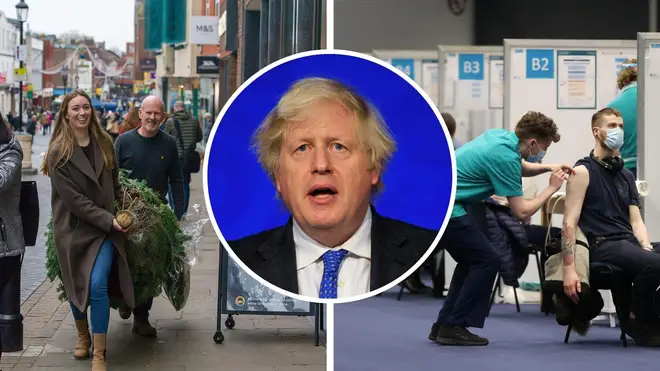
Tonight with Andrew Marr 6pm - 7pm
22 December 2021, 16:19 | Updated: 7 June 2023, 08:56

Initial studies have suggested the Omicron variant of Coronavirus is milder than Delta, as pressure builds on Boris Johnson to outline any further restrictions that could come into force after Christmas.
Mr Johnson has reassured people living in England that no further rules will be introduced before December 25, but has stressed the situation is under constant review.
His decision to hold off on introducing any further restrictions is down to a lack of evidence on the severity of the Omicron variant and hospital admission to justify bringing in any stricter measures.
In a study which was leaked on Wednesday, scientists said patients infected with the Omicron variant are less likely to become severely ill compared to Delta, according to Politico.
The UK Health Security Agency (UKHSA) said a booster jab offers a much higher chance of protecting from developing symptoms and ending up in hospital.
Read more: Covid self-isolation period cut from 10 days to seven in bid to save Christmas
Read more: Health minister tells LBC: Don't plan NYE party if you can't cancel quickly

James O'Brien defends Boris Johnson's decision to delay measures
But it also warned that it may not be so mild that it won't lead to increased numbers of people in hospital.
Meanwhile, research from Imperial College London indicates that people with PCR-confirmed Omicron are 15 to 20% less likely to need admission to hospital, and 40 to 45% less likely to require a stay of one night or more.
Scientists in a separate Scotland-wide study called Early Pandemic Evaluation and Enhanced Surveillance of Covid-19 have said Omicron is associated with a two-thirds reduction in the risk of hospitalisation compared with Delta.
However, researchers have added that although Omicron appears less severe, it is more transmissible partly because the current crop of coronavirus vaccines are less effective against it.
The findings of the studies come as the Prime Minister faces calls to act on the rising number of Omicron cases in England.
In Wales, First Minister Mark Drakeford has announced new measures to be introduced from 6am on Boxing Day, such as the rule of six in hospitality venues, cinemas and theatres.
In Scotland, First Minister Nicola Sturgeon has already introduced new curbs on hospitality while live sports will be "effectively spectator-free" for three weeks from Boxing Day.
Mr Johnson has refused to rule out any further measures from Saturday, but said the "uncertainty" of several factors, including how severe Omicron is, the hospitalisation rate and the impact of the vaccines and booster jabs, meant he did not think now was the time to impose restrictions.
Read more: Wales imposes rule of six on hospitality and slashes size of large events
Read more: 'Go ahead with your plans': Boris Johnson confirms no new Covid restrictions for Christmas

"Can I send out my invitations for my New Year's Eve party?"
Mr Drakeford criticised what he called the UK Government's inaction over rising Omicron cases, saying: "I believe the UK Government sees all the data we see and gets all the advice that we get about the need to act and act urgently in the light of the Omicron wave coming our way."
He added: "They are paralysed by their internal divisions and are unable to act on it."
Mr Drakeford went on: "I heard the Prime Minister earlier this week in an interview say the position had never been more urgent. And asked what he was going to do about it, he said that he was doing nothing. Well, that would not be acceptable to me."
However, health minister Gillian Keegan defended the Prime Minister's decision to be cautious about bringing in new measures, explaining they are taking a "balanced and proportionate approach".
Read more: Covid jabs recommended for at-risk 5 to 11-year-olds

Boris Johnson confirms no new measures for Christmas
Speaking to Nick Ferrari at Breakfast, Ms Keegan warned the public that New Year's eve events will be "uncertain" as the Government waits for further data on the Omicron variant.
When asked whether or not it was a good idea for Nick to send out his New Year's eve party invitations, the MP said: "All I will say is there is uncertainty so if, you know, you cant change your plans quickly then maybe think about it.
"We are trying to take a balanced and proportionate approach so that people can see their families over Christmas, to try and plan some stuff.
"But of course it is difficult to anticipate because we don’t have that future data yet we have to get the data and we have to analyse it in real time."
Read more: Christmas rail crisis as Covid hits staff and firms warn of 'short notice cancellations'

Sadiq Khan: 'Things are only getting worse'
Health Secretary Sajid Javid has also advised everyone to "remain cautious" over the Christmas period.
It comes as a last-minute change to Coronavirus guidance could see thousands free from their isolation in time for Christmas - as the UKHSA confirmed the self-isolation period will be cut from 10 to seven days.
Under the latest advice, two tests can be taken 24 hours apart - on day six and seven of an isolation period - and, if the results are negative, quarantine can come to an end.
The UKHSA said people who leave self-isolation on day seven are strongly advised to limit close contact with other people in crowded or poorly ventilated spaces, and to continue working from home.